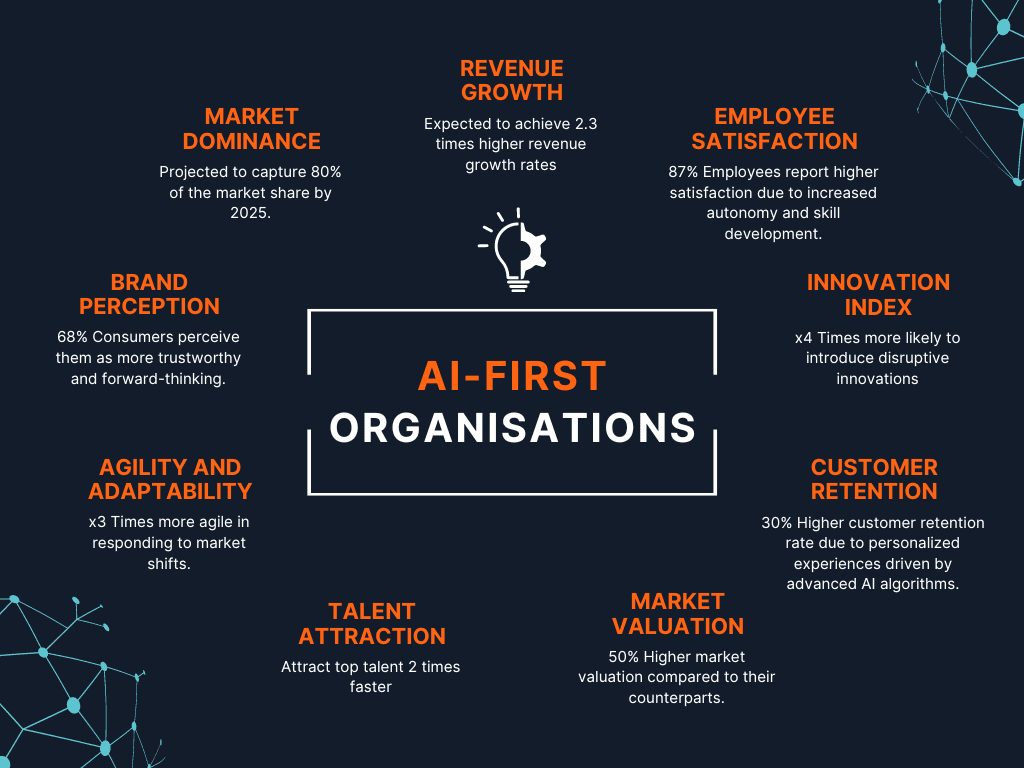
Applying AI vs. becoming an AI-first organisation
Transitioning from applying AI to embracing an AI-first culture is the key to unlocking transformative business potential
In the era of technological evolution, the application of Artificial Intelligence (AI) has become a strategic imperative for businesses. However, there is a fundamental distinction between companies that merely apply AI as a supplementary tool and those that embrace an “AI-first” approach at their core. This article delves into the nuances of this dichotomy, shedding light on the transformative impact of being an AI-first organisation.

Table of Contents
First steps when applying AI
Many businesses today incorporate AI into their operations, often as a response to industry trends or competitive pressures. They might employ AI tools for tasks like data analysis, customer segmentation, or predictive maintenance. However, merely applying AI represents a surface-level engagement, lacking the depth and organisational mindset necessary for true transformative change. These companies typically view AI as a means to optimise existing processes or solve specific problems within their operations. While valuable, AI in such organisations is often compartmentalised, serving as an add-on rather than a fundamental driver of strategy.
The essence of an AI-first organisation
Contrastingly, an AI-first organisation goes beyond sporadic AI applications. It embodies a culture that prioritises and integrates AI seamlessly into every facet of its operations. This mindset emphasises a proactive approach to innovation, treating AI not as a tool but as a core component of the organisational DNA. An AI-first organisation embraces continuous learning, experimentation, and adaptation to leverage AI’s potential fully.
Key differentiators
Building an AI-first culture
AI application companies may view AI as a tool wielded by data scientists or IT departments. However, in AI-first companies, the entire organisation embraces AI as a transformative force. Transitioning to this type of organisation involves fostering a culture that values curiosity, collaboration, and a relentless pursuit of improvement. Employees across departments are organically encouraged to think creatively about how AI can improve their workflows and enhance customer experiences.
This may include investing in employee training, creating cross-functional AI teams, and establishing frameworks that encourage experimentation and risk-taking. Embracing an AI-first culture is an ongoing journey, requiring commitment and a long-term vision.
Transformative impact on operations
Organisations applying AI may experience localised improvements, but an AI-first mindset catalyses a more profound and comprehensive transformation. From data analysis and customer interactions to internal processes and decision-making, an AI-first approach reshapes the entire organisational ecosystem. This shift not only improves efficiency but also opens new avenues for business competitive advantage.
Breaking boundaries: true innovation and experimentation
AI application companies often adopt established AI solutions or frameworks, reluctant to deviate from proven paths. On the other hand, AI-first companies foster a culture of experimentation, constantly pushing the boundaries of AI capabilities. They invest in research and development to create proprietary AI algorithms tailored to their specific needs, giving them a competitive edge in the market. In fact, companies that effectively leverage AI are 1.5 times more likely to report growing their market share compared to competitors according to McKinsey.
Customer-centricity
While both types of companies aim to enhance customer experiences, AI-first companies excel in personalisation and predictive analytics. By leveraging AI to analyse vast datasets, they can anticipate customer needs, deliver hyper-targeted recommendations, and provide seamless, intuitive interactions across channels, which translates into greater customer satisfaction and engagement.
Implications for the future
The distinction between AI-driven and AI-first companies is not merely semantic; it has profound implications for future competitiveness and innovation. As AI continues to evolve, businesses must decide whether to treat it as a peripheral tool or embrace it as a core strategic asset.
For AI application companies, the risk lies in falling behind competitors who fully embrace AI-first principles. As customer expectations evolve and markets become increasingly saturated, their reliance on off-the-shelf AI solutions may hinder their ability to differentiate and innovate.
Conversely, AI-first companies are poised to lead the charge in shaping the future of their industries. By embedding AI into their organisational DNA, they can adapt more quickly to market shifts, deliver superior customer experiences, and uncover new opportunities for growth and differentiation.

Adopting an AI-first culture for organisational growth
In conclusion, the era of technological evolution calls for a paradigm shift in the way businesses approach Artificial Intelligence (AI). Simply applying AI as a complementary tool is no longer sufficient in today’s competitive landscape. To truly thrive and innovate, organisations must adopt an approach that prioritises AI at its core. This means integrating AI seamlessly into all facets of operations, fostering a culture of experimentation, and prioritising continuous learning and adaptation. The transformative impact of becoming an AI-first organisation is profound, leading to greater efficiency, superior customer experiences and unprecedented competitive advantage.
At Nucleoo, we specialise in guiding businesses on their journey to become AI pioneers, empowering them to unlock the full potential of AI and stay ahead of the curve. Contact us today to embark on your transformation journey and elevate your organisation’s value in the age of AI.

Written by
Blanca Barón – Business consultant at Nucleoo


